“The chieftaincy in Sierra Leone was established in 1896, when [Britain’s Colonial] Governor [Frederic] Cardew transformed society by empowering a set of Paramount Chiefs as the sole authority of local government in the newly created Sierra Leone Protectorate. The chiefs remained effectively the only institution of local government until the World Bank sponsored creation of a system of local councils in 2004. Under the system, chiefs are elected for life by a Tribal Authority made up of local notables. Only individuals from the designated “ruling families” of a chieftaincy, the aristocracy created and given exclusive right to rule by the British at the initiation of the system in 1896, are eligible to become Paramount Chiefs”. [The Chiefdoms of Sierra Leone, Tristan Reed and James A. Robinson, July 15, 2013, Harvard University]. Up until 2017, there were 149 chiefdoms in Sierra Leone which were then expanded to 190. Although chiefdoms are a third-tier governing body after the national government and local councils, they remain an important forum for apportioning land and resolving disputes. It is also worth noting that the “local notables” are those who consistently pay taxes to the chiefdom and essentially anyone can become a “notable” if they have sufficient money to pay these taxes.
Last week in Kenema’s Nongowa Chiefdom, the election of a new Paramount Chief was held. There were 16 individuals vying for the position, all of them from “ruling families” within the chiefdom. A local judge ruled that the families needed to consolidate and each put forth one candidate rather than have multiple members of the same family seek the position. When this did not happen according to the ruling, the judge called for an immediate election to narrow the field. That election was held on Monday and brought the field down from 16 to 2. Sidique Kapuwa and Mohamed Gombolongo. On Tuesday, the runoff was held and Sidique Kapuwa was elected. Mohamed Gombolongo returned to his position as Town Chief, a position that many say is redundant now that there is a mayor in Kenema. We have also been told that when Gombolongo dies, the position will be eliminated and there will no longer be a Kenema Town Chief. Also reporting to the Paramount Chief are section chiefs. These are the chiefs of the smaller villages. In fact, even within Kenema, there are 5-6 different section chiefs which represent various areas within the city. Paramount chiefs receive payment from the government, but the section chiefs and town chiefs apparently only receive monies from the constituents as they resolve disputes.

It is with this background that we want to share our unique experience this week. On Wednesday we went to Bo with Junior Bendu and his assistant Ibrahim. The mission president agreed to install solar power in Elder & Sister Moomey’s apartment as they have been sleeping at night without fans and in the evenings they have had to run their generator to get lights. National Power has been extremely rare of late and with the nights getting warmer it is more important than ever to get them lights and fans from solar power.
Junior was born and raised in Blama, a town that is 21 km west of Kenema. On the way to Bo he again told us this and mentioned that Blama is a big town. However, this is not an obvious fact when one drives past the town on the Bo-Kenema highway. Junior said the town is on the south of the road concealed by the trees along the road. He said if we had time, we should drive through it on the way back. So that is what we did. We were actually surprised just how big a place Blama is. Not huge like Kenema, but respectable. There was even a market about a kilometer in from the road. As we continued to drive, Junior gave us directions to drive to the Paramount Chief’s compound so we could see it. When we arrived, the road-dead ended so we had to turn around. Pointing to a group of people sitting under a pavilion, Junior said, that is the Paramount Chief in red, we should go greet him. So again, that is what we did.
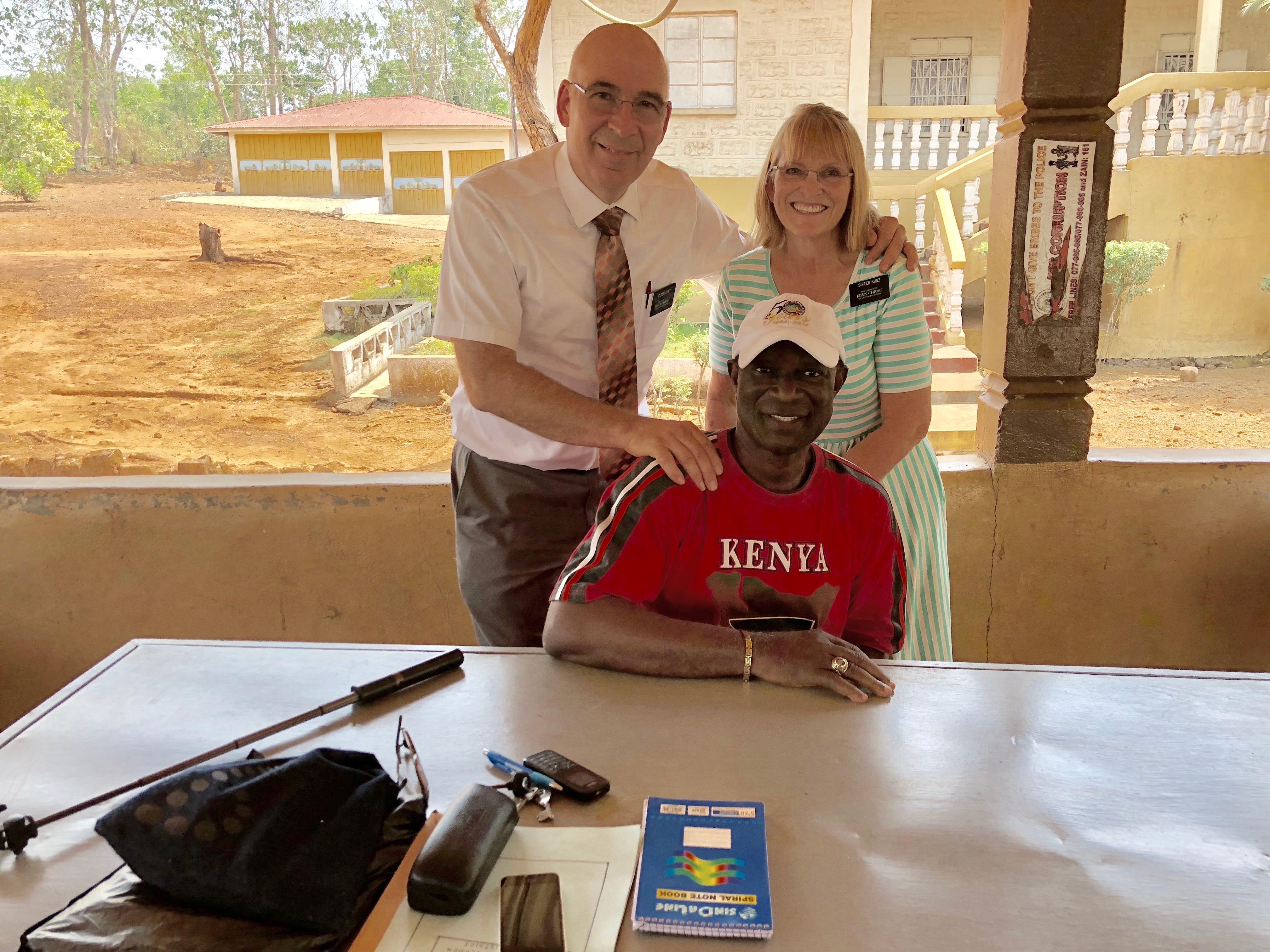
We were pleasantly surprised to learn that their Paramount Chief, whose name is Mohamed Dhaffie Benya V, lived in the USA for 27 years, including the majority of that time in Houston. His English is flawless. He worked as a consultant to the Texas State government and knew all of the names of the governors from Mark White to George W. Bush. He had lived in the Spring area and was familiar with all of the local landmarks. He left Sierra Leone on a student visa in 1974, attending the University of Massachusetts for a bachelor degree and a master’s degree from Boston Suffolk University in public administration. After graduating he got a job and applied for and received a green card. But he said he knew he would always come back to Sierra Leone. His father was a Paramount Chief and when he died, his aunt took on the responsibility and served in the position up until her death in 1996. When she died, he was asked by the village leaders to return to Blama and take up the role as Paramount Chief, but because of the civil war and a government coup on May 25, 1997, his return was delayed for nearly 5 years. He is now in his 18th year as the Paramount Chief of Small Bo Chiefdom located in Blama. His credentials are impressive and his reputation well-known. He even served in Sierra Leone’s parliament as the Chairman of the Eastern Region Paramount Chiefs, one of 12 positions held in parliament by Paramount Chiefs across the country. Pretty impressive for a young man from a small town like Blama. As we sat under the pavilion speaking to this well-educated, yet humble public servant, we could not help but be impressed by his willingness to leave a bright career, affluent lifestyle and his many friends to come home to help his people. He is an impressive man and one we will not soon forget.
Weekly Highlights
After a very busy week last week, we were grateful for a bit of a reprieve. Still plenty to do, but the pace was slower and while we like to be busy, we do appreciate a small break now and again.

On Monday, we taught a family home evening lesson for the young single adults in Hangha Road Branch. We were supposed to begin at 5 pm, but there were only 2 people there plus the 2 elders, so we waited until 5:40 and between then and 6:00 pm we had 9 more arrive. We had a really nice discussion about the atonement of Jesus Christ. It is interesting that Jehovah tried to again teach the people about the mission of Jesus Christ with the imagery of raising the brass serpent, but unfortunately the people were hard-hearted and refused to understand. Just one more evidence of the love of God that is manifest by His constant reaching out to us to teach us and help us to “learn” and then “do” so that we can return to him someday. LaDawn again made delicious peanut butter cookies to share with them. As always, they were a big hit.
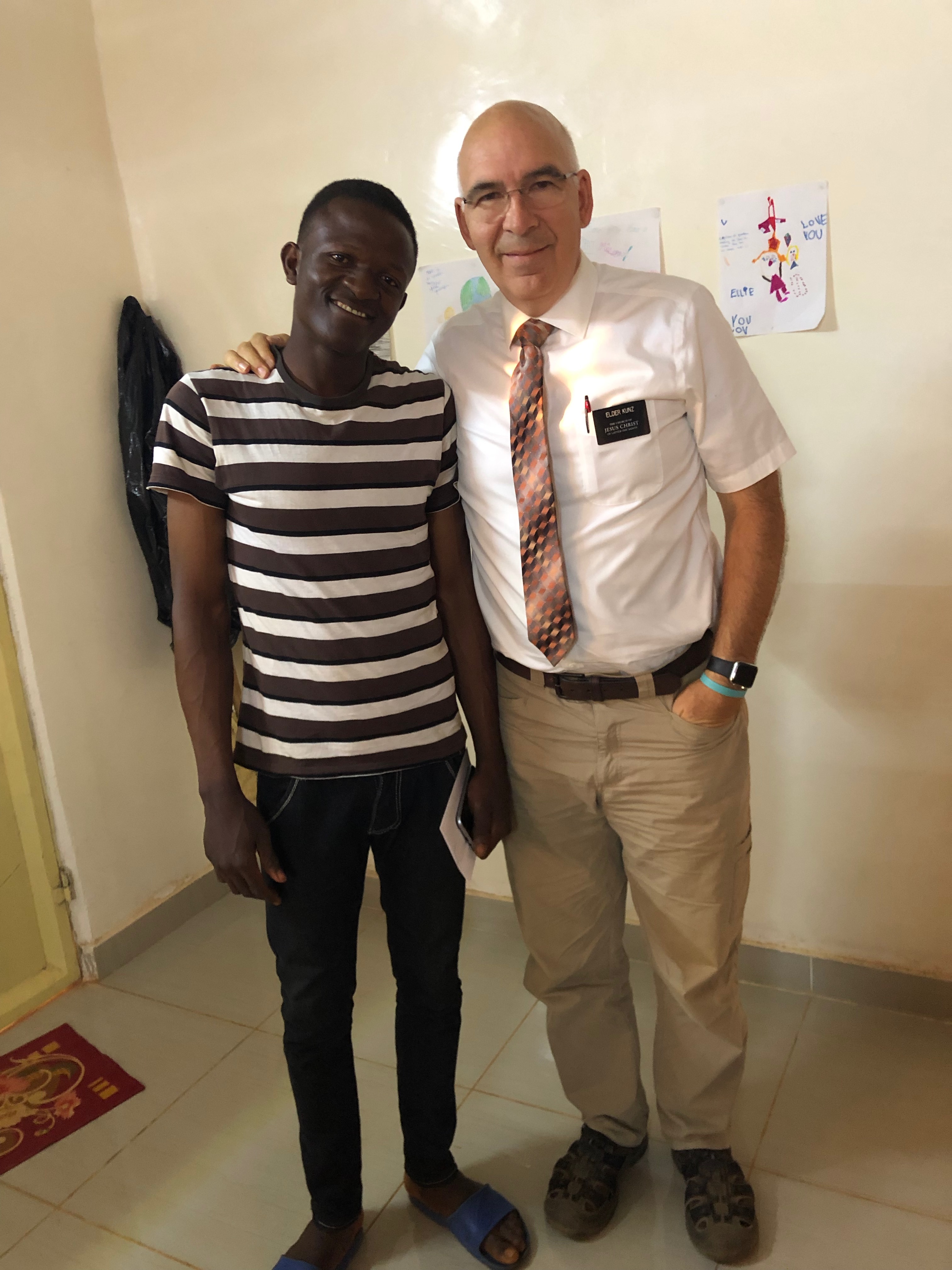
Solomon Amara 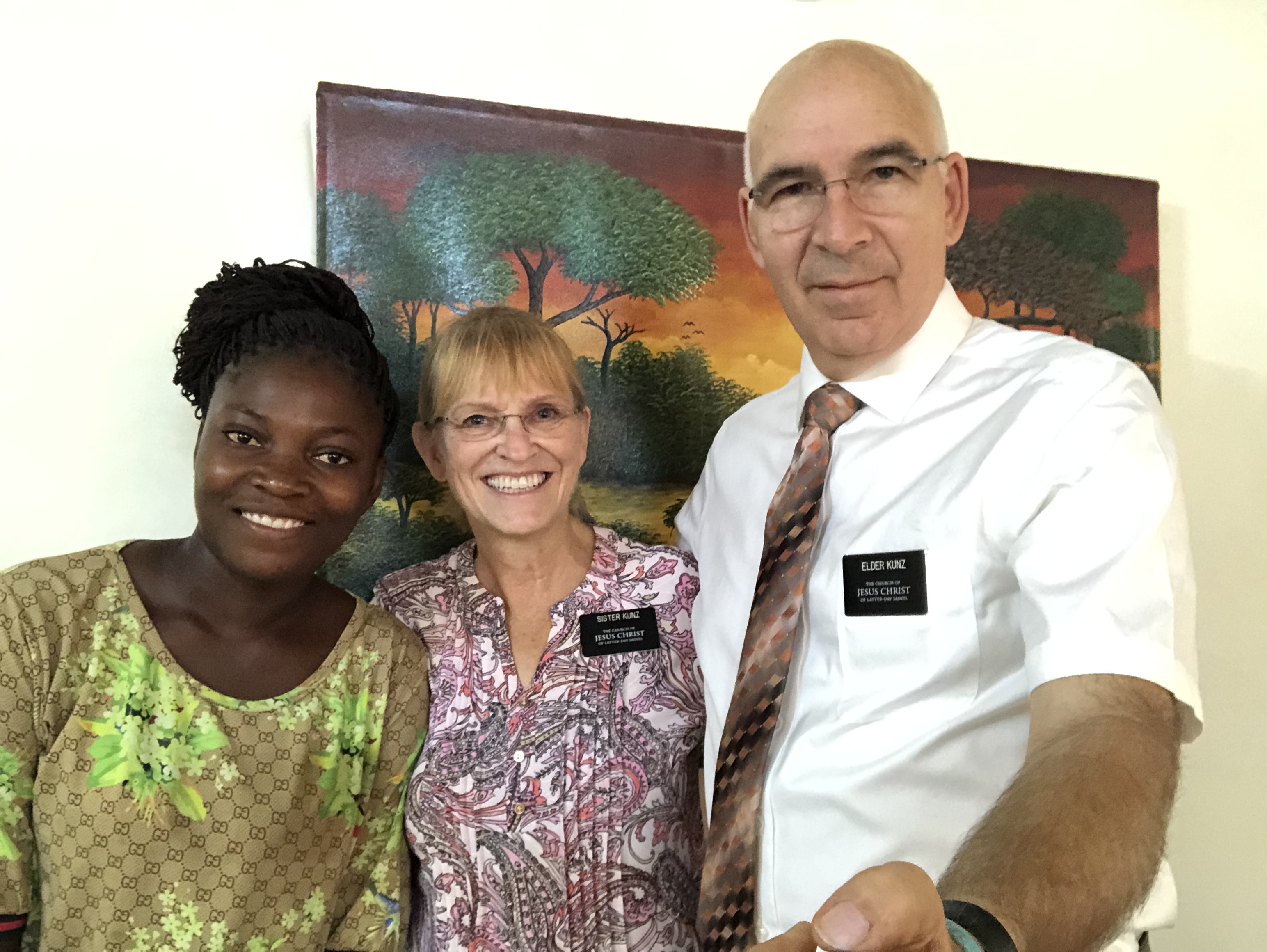
Nancy Tamba
On Tuesday we had three visitors. The first was Junior Bendu who came over so we could scope out the materials for the solar installation at the Moomeys, detailing both cost and quantity and a plan for getting it done before the week was out. Our second visitor was Solomon Amara. Solomon’s mission call had arrived and was available electronically. Because we have internet at our house, he came here to open and accept the call. He will be going to the Nigeria Benin City on April 18th. Our third visitor was Nancy Tamba. Nancy left on Wednesday for the Nigeria Ibadan Mission. She is one of three missionaries from Kenema District going to that same mission on the same day. She wanted to come over and spend some time with us before she left. She was the first prospective missionary that we helped to boost hemoglobin levels to qualify for a mission. She will be a fine missionary and a sister who will want to work hard in spreading the gospel. Whoever her companions are, we hope they are ready to work! We are so grateful for the faith of these young men and women who have such a great desire to get out of their comfort zone and serve a mission. We pray for and care about them as if they were our own children.
Wednesday was the day that we traveled to Bo with Junior and Ibrahim to scope out the Moomey’s apartment, mark the walls where the plugs and light switches were to be placed and make a visit to the shop where we planned to buy the materials. The man we purchased from is named Mohamed Juma Barrie. We purchased the panels, batteries and inverters for the Airfield and IDA apartments from him and when we had trouble with two of the panels, he took them back with no questions asked. A very unusual thing here in Sierra Leone. We learned from Junior that Mohamed Barrie is part of the Fula people. I had not heard of this group before, so I did some research. According to Wikipedia, the Fula people are the third major ethnic group in Sierra Leone after the Mende and the Temne. About 10% of the 7,000,000 people in Sierra Leone are Fula. They tend to keep themselves separate from the local agricultural populations as they have a keen sense for business. Many of the shopping centers in Sierra Leone are owned by the Fula people, of which 99% Muslim. The majority are descendants of the Arab Nomads and while the men are generally traders (merchants) the wives are the accountants of the family. All we can say is that it is a pleasure to do business with him as he gave us the panels, batteries and inverter for the Moomey’s apartment before we had the check to give him in return. Now that is trust with a capital “T”!
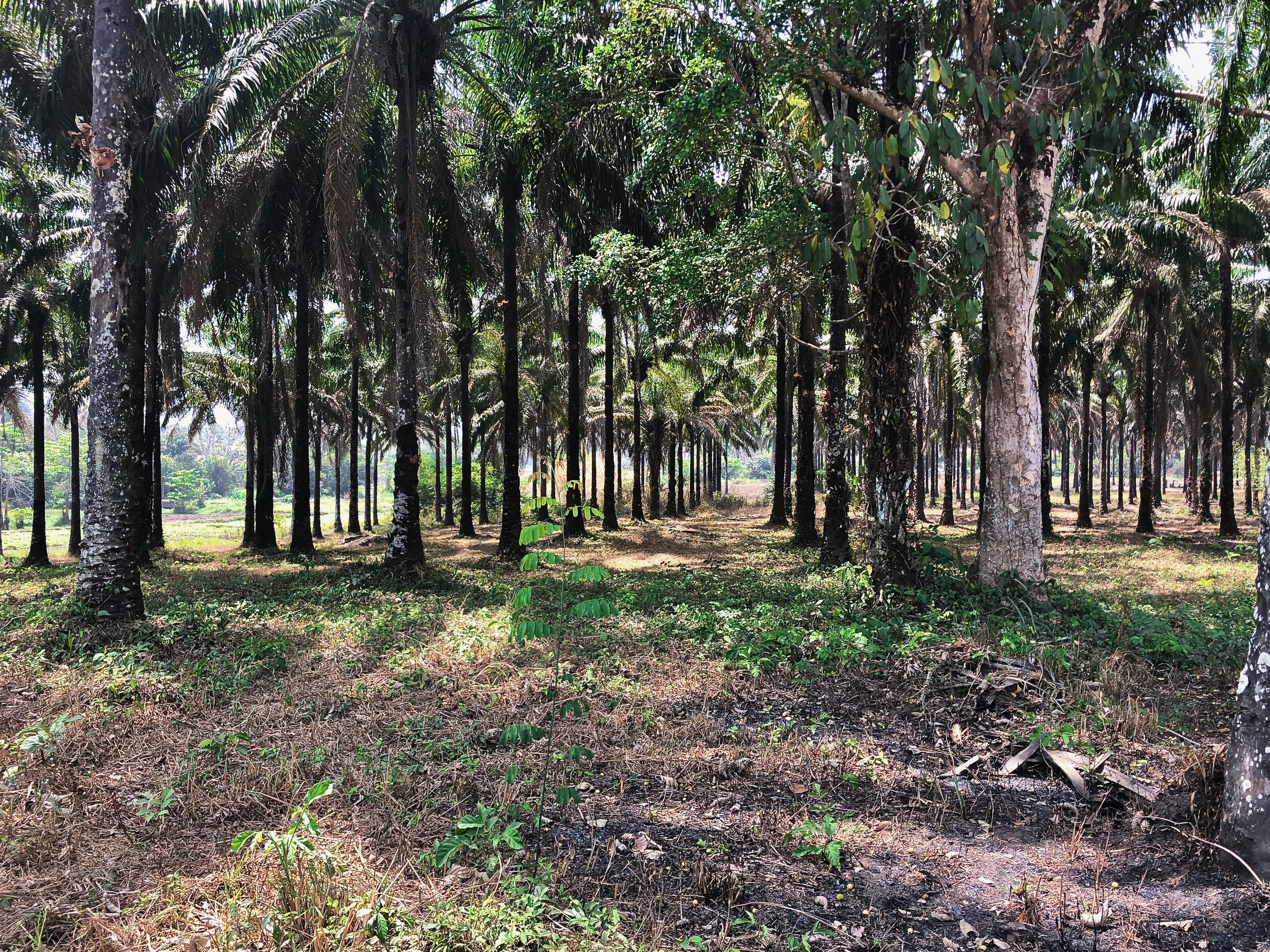
Palm Tree Orchard 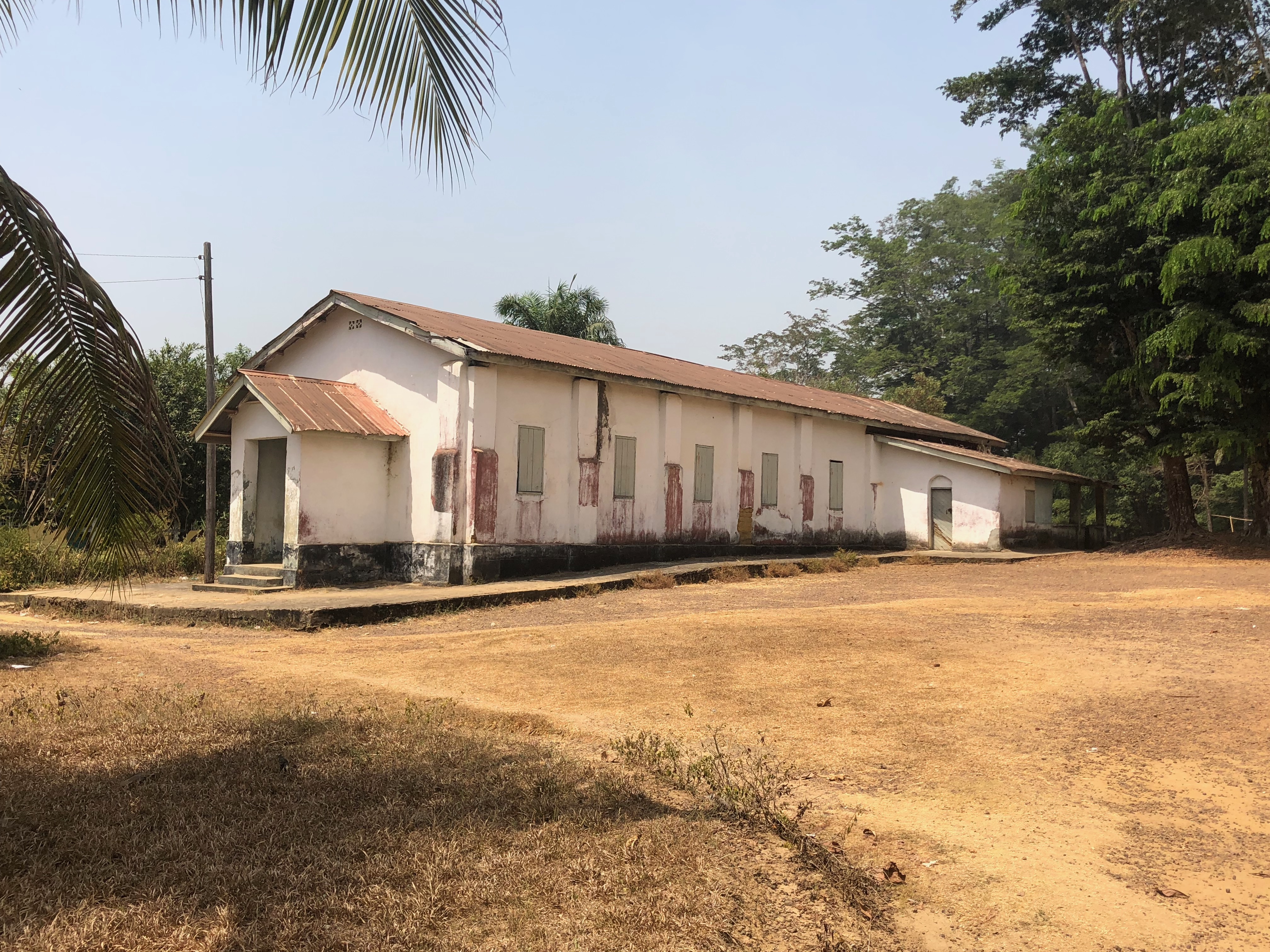
100 year-old Catholic Church 
Beautiful “ground-nut” tree 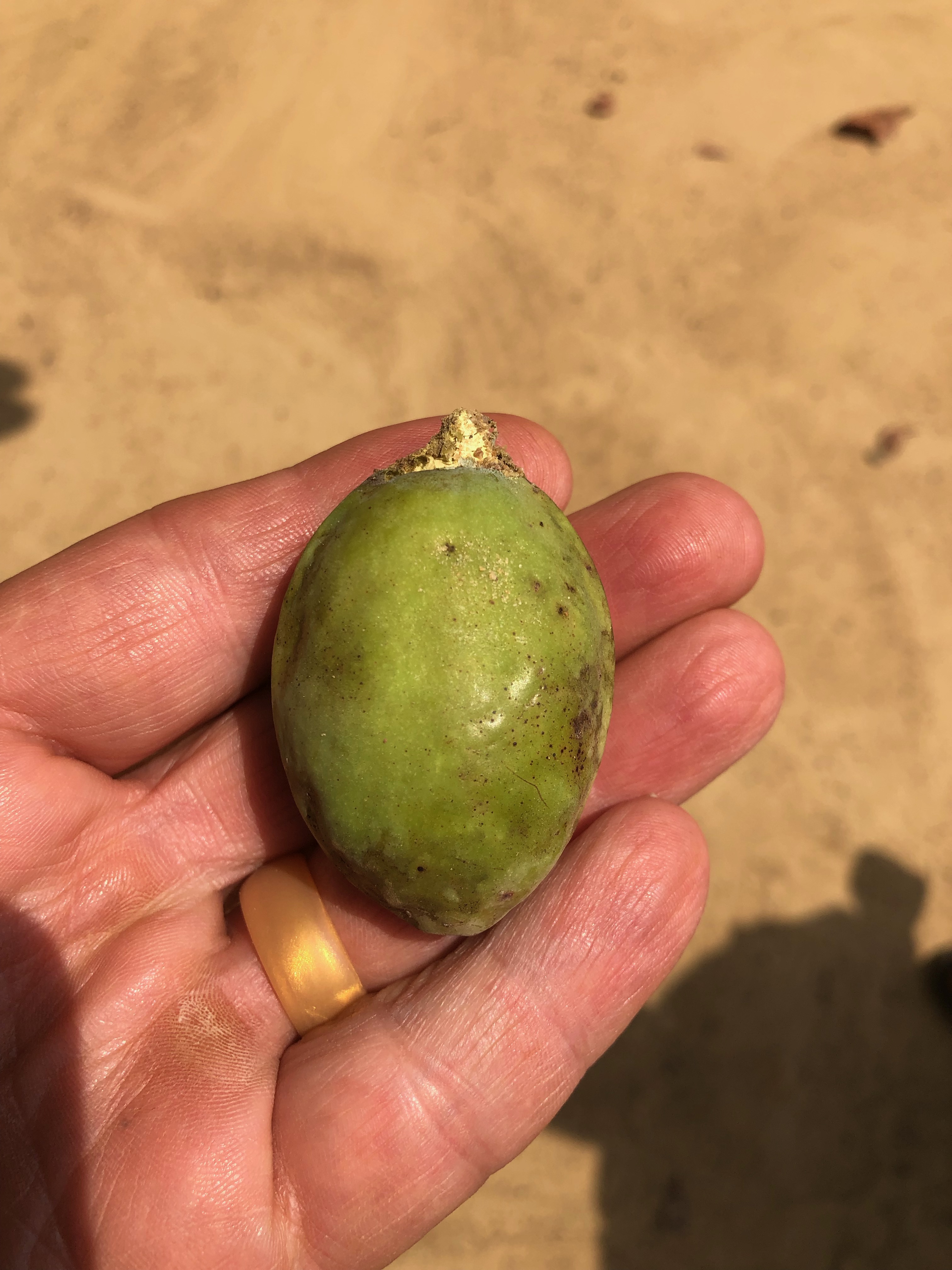
“ground-nut” pod
On the way home we stopped in Blama and visited with the Paramount Chief as mentioned above. In Blama there is a beautiful orchard of Palm Oil trees that the Catholic Mission planted many years ago. There is also a church there that is over 100 years old as Blama was an early Catholic mission established by Bishop John O’Gorman in the early 1900’s. The area around the Catholic Mission can only be described as beautiful and peaceful. There are small plots of gardens that the church allows the people to garden, there is a big secondary school and of course the palm oil trees. One of our favorite places so far that we have visited. While we were there we noticed a big beautiful tree in front of one of the church buildings. When I asked Junior what it was he said it was a ground-nut tree. He found a pod that had fallen from the tree, broke it open and inside was a small delicious, almond-like nut. I have tried to find the actual name of this tree but to no avail. Ground nuts here are peanuts, and this is not a peanut. I will continue to pursue this mystery!
On Thursday, we headed back to the Moomey’s with a shelf on which to store the solar batteries. We thought we could have one built in Bo, but they wanted more than double what it cost in Kenema. Even though the amount was comparatively small ($20 vs $10), the principle drove us to have it made by our local carpenter here in Kenema and then deliver it back to the Moomey’s apartment.
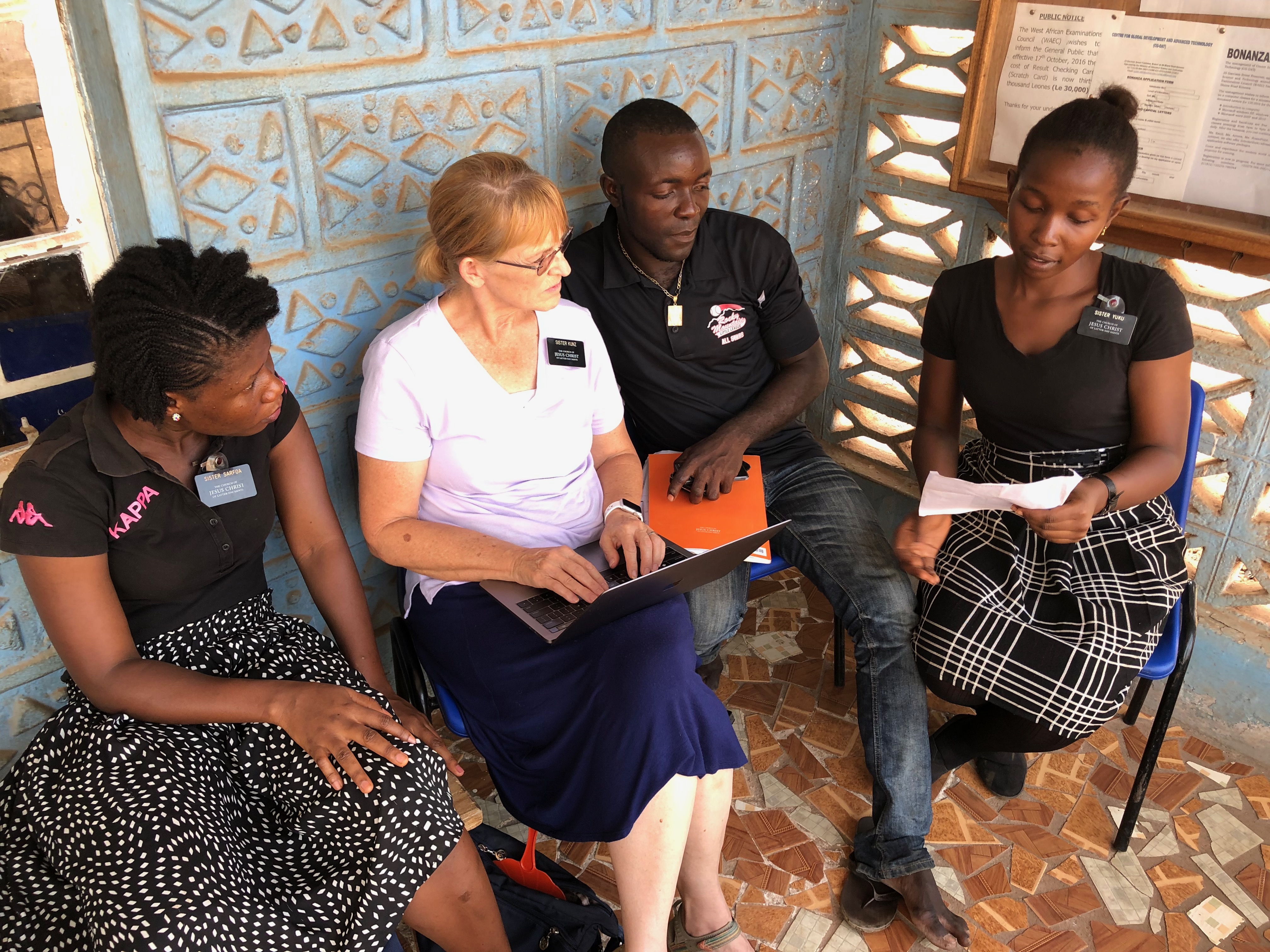
When we arrived back home we met as agreed earlier with Sister Sarfoa and Sister Yuku and went with them to visit a new member, Amara Bockarie Memoh. We helped him input his family names. He had information for 10 ancestors’ names consisting of 45 temple ordinances. We love the feeling from the spirit of Elijah that we get when we are working closely with the missionaries and members here to submit names to the temple. It was just one more joy-filled experience for all of us!
After returning home from our family history appointment I spent the rest of the evening preparing some training for the branch clerks to be held Saturday morning at the request of the District clerk, Francis Kamara.
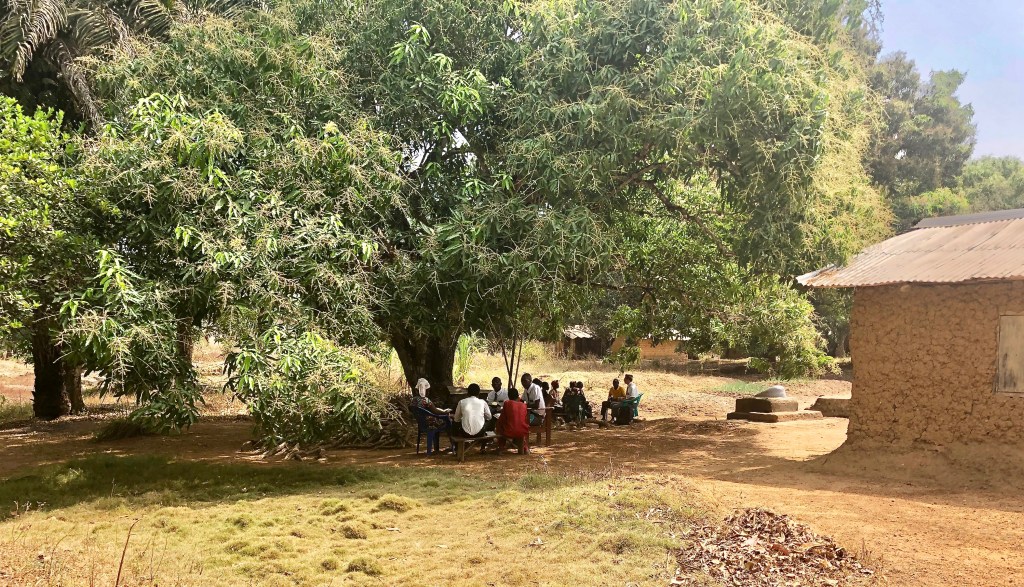
Friday was Tongo day. This time, Emmanual Morison, a recently returned missionary in the IDA Branch went with us. There are always ebbs and flows as to the number of people that we teach and on Friday it was more an “ebb” than a “flow”. We taught John, Rebekah Grace, Konowa, Lasana, Kadie, Mary and a new man named Ibrahim, who is a friend to John.
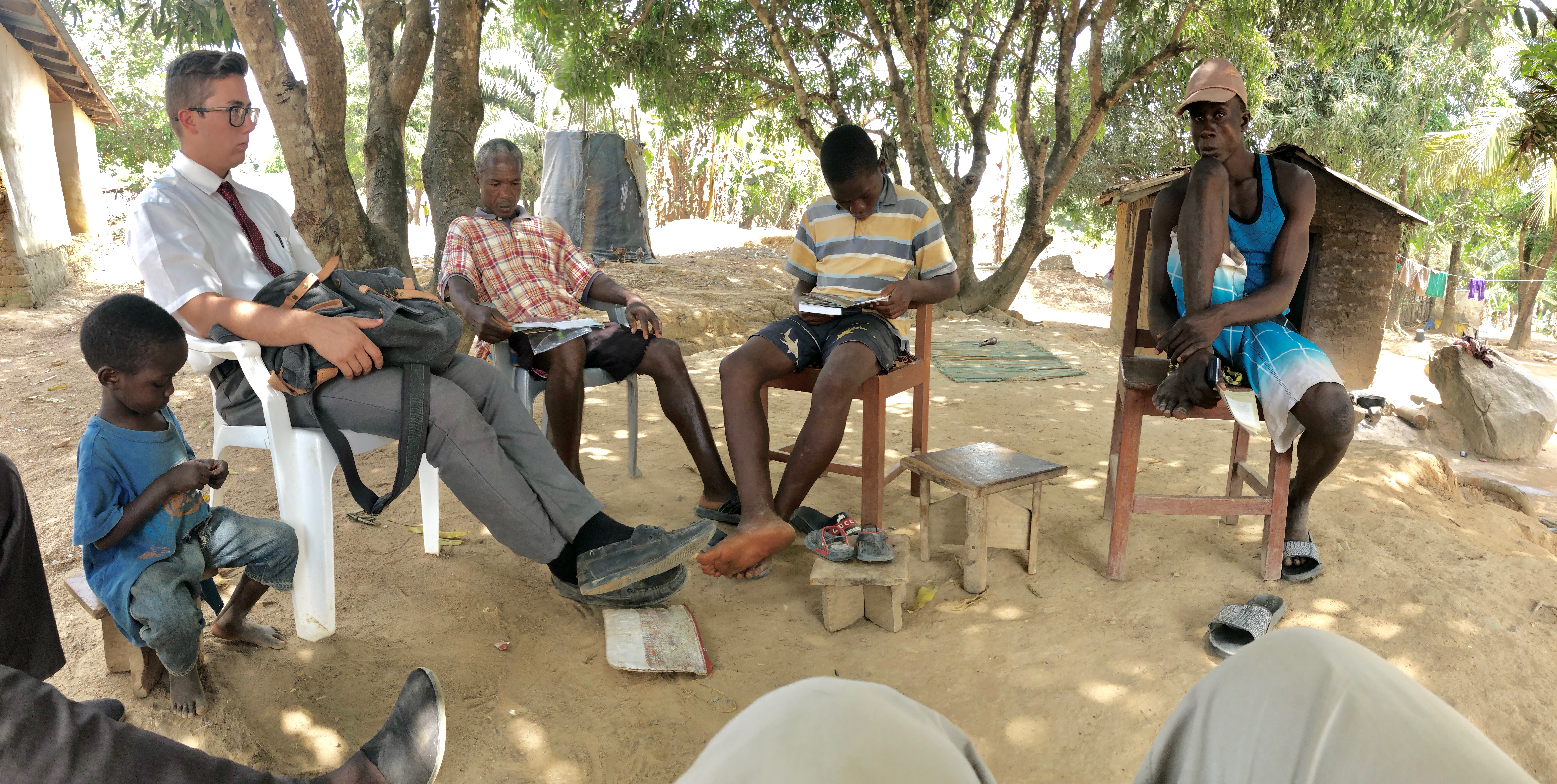
Elder Wallentine teaching Sahr Lahai and his sons Daniel and Ibrahim 
Elder Lunga and Emmanuel Morison teaching Sarah and Joseph Kanu
We taught Sahr Lahai and his two sons, Daniel and Ibrahim. Ibrahim is about 20 and a strong young man who quit school and went to work at a mining company. We also taught Hannah, whose son Moses is in Bo going to school and now has a baptismal date for later this month. At the same time, Elder Lunga and Br. Morison taught Ishmael, the young man in the wheelchair. At the Kanu family’s home, only siblings Sarah and Joseph were there as everyone else was either traveling or had gone to the market. Their father was not feeling well. Last week it was 20 people and this week it was 14. Still, to have between 14 – 20 people being taught and coming to church each week is a wonderful thing. As we say each week, the people in Tongo are special! As we now have baptismal dates for at least 3 people and expect to have the same date for 3 more in the next week or so, we have to figure out where the baptisms will be held.
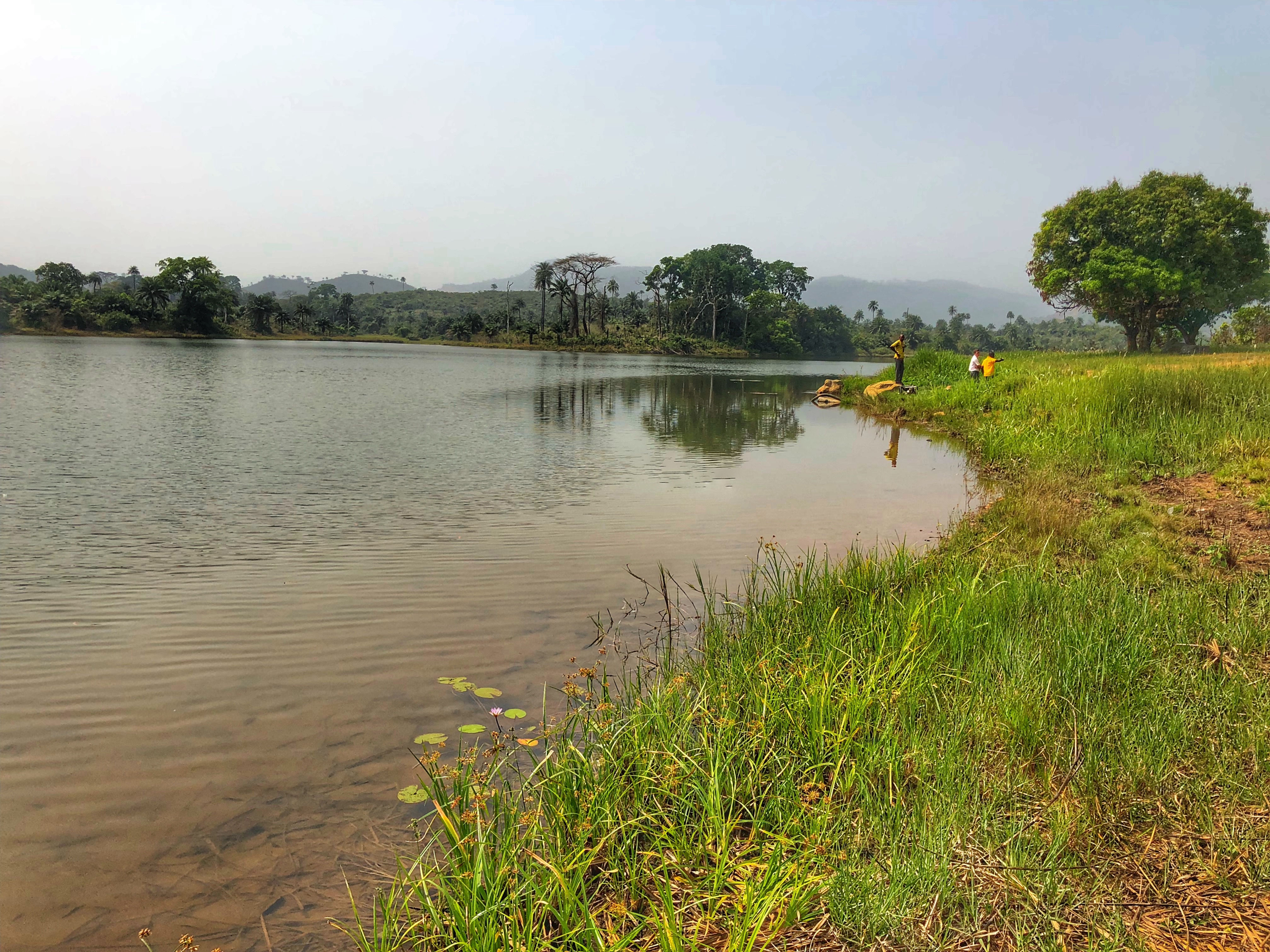
There is a very nice lake in Tongo, the locals call it “Aqua”. It was a apparently a mining pit, but perhaps they hit a spring or something, because today it is definitely a lake. Missionaries are not allowed to baptize in fresh water, but there is no restriction for members. If you are wondering why they cannot baptize in fresh water, it has to do with a parasitic disease called schistosomiasis. A person can contract the parasite from wading, swimming or just entering fresh water in any way. The parasites live in the snails, but can exit them and then penetrate right through a person’s skin and end up in blood vessels where they can live for many years. It’s not the worms that cause the problem, it’s the eggs. The eggs have sharp barbs which can lodge in different tissues and cause severe symptoms ranging from anemia and fatigue, and in 10 percent of chronic cases, even death. So fresh water is not an option for missionaries. Whether we will end up using “Aqua” or not remains to be seen.

One more thing to mention about Tongo this week. Brother Kongoley, Elder Wallentine, Brother Conteh and I went over to the radio station to discuss having an “on-air” interview during prime time about the church. The station was very receptive and indicated cost would be about $35 to book an hour long interview. Seems like a bargain. The church already has a good name in Tongo and we believe this will help the growth there even more. More to come!
After arriving home we made our way over to the Opportunity Training Center to spend some time with Eku Scotland. We had given him Alma 32-34 to read, and read he did. It is obvious to us that he is coming to cherish the Book of Mormon as a source of truth and light. We wanted him to read these chapters to be able to discuss how the seed of faith grows. He explained to us that if you are a member of the Jehovah Witnesses and are found out to be studying another faith, or worse, attend a church meeting of another faith, you will be disfellowshipped. Yet despite the personal risk, he continues to be curious about the gospel of Jesus Christ in its fullness that is taught by the Church of Jesus Christ of Latter-Day Saints. As we talked about chapter 32, he really loved verse verse 16: “Therefore, blessed are they who humble themselves without being compelled to be humble; or rather, in other words, blessed is he that believeth in the word of God, and is baptized without stubbornness of heart, yea, without being brought to know the word, or even compelled to know, before they will believe.” Eku is a very believing man. He has great faith in God and knows that He loves him as a son. Despite his disability and hardships throughout his life, he has never allowed them to stop him from doing good for others. He has chosen to be humble and that says so much about him. We talked about how one plants the seed and how to know if the seed is growing. We can see it growing in him, and we suspect he is beginning to see it as well.
Saturday morning was busy. One of our recently returned missionaries came over and we spent about 45 minutes talking about how he might pursue some work with timber on land that was left to his family when his father died. His father passed away while he was on his mission, and some of the family was unhappy with him because he did not come to the funeral. They did not understand his commitment to his mission, but with the passage of time, their hearts softened and they recently turned over 7 acres to him and to his mother. Now he needs to think about how to do something with it, either through agriculture, timber or both. We talked about putting together a business plan to fully appreciate and understand what challenges he might face and how he will work through them. I told him if he would put what he could on paper, I would be more than willing to sit down and talk it through with him, using my education and experience to counsel with him about how to make it work.
By the time we finished it was 10 am and the training was to start at 11 am. I needed copies made so I stopped at the copy place, but their generator was down so I was unable to have them for the meeting. Fortunately, I was able to get them later in the day. From there I went over to EDSA (the power company) taking two generator batteries that needed to be charged. When the guys worked on the generator for the sisters next door, they literally ran down two batteries trying to get it to start (one was brand new). When it finally started, the guy said if we left it for an hour the battery would charge, but it never happened. When we tried to start it back up, neither battery would even turn it over. Later in the day when I picked up the batteries and Charles (our guard) helped me to install it, the generator fired right up. That was good. Now I am hoping it will hold the charge.

The training was held at the district center (often referred to as the Gombu building since that is the name of the area where the building is located). We had 5 of 8 branch presidents and 6 of 8 branch clerks (Kailahun was exempted because of the distance). We discussed the duties of the branch clerk and the importance of all of us raising our own performance bar so that we can make sure we have accurate and timely reporting. Most of the clerks are good at what they do, a few are excellent. We are all hopeful that we can all do a little bit better as we move towards becoming a stake.
After the clerk training, President Cobinah shared some important messages from the recent coordinating council meeting he attended. He picked 6 items to talk about in the remaining time. 1) Playing only appropriate music, at the appropriate volume in our church buildings during branch activities or wedding receptions. 2) Getting our YSA committees at both the branch and district level organized by March 22nd. 3) Mentioned that BYU Pathway is coming to Sierra Leone with a focus in Freetown and Bo. 4) Making sure we have the annual church history submission completed on time. 5) Mentioned that some of the Church general auxiliary presidents/counselors will be coming to Africa West Area March 1-10th. Whether there will be a broadcast transmission is not yet known. 6) The importance of thorough and complete temple recommend interviews. Overall a very good training meeting for clerks and branch presidents.
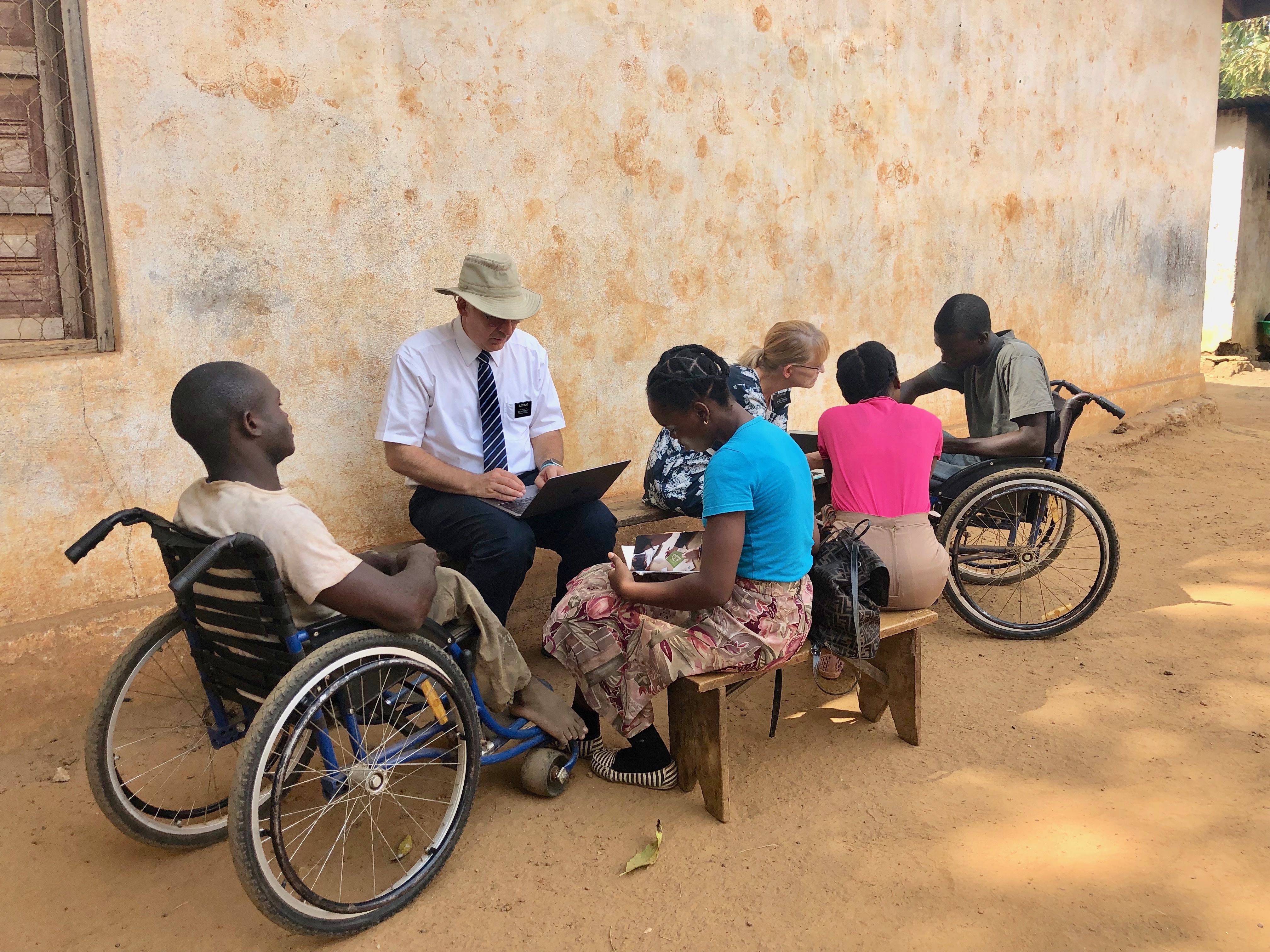

From there we headed back to the district center for Choir practice. Right now we are learning, “Beautiful Savior”, “I’m Trying to be like Jesus” and “We are Marching onto Glory”. Great songs for a district conference!
On Sunday we attended the Dauda Town Branch. We always love being with these wonderful saints. The talks were excellent in sacrament meeting and there were about 75 in attendance. The District sustained 6 new District Councilors on Sunday with still a few more to call in order to have a full “high” council of 12. Exciting times in Kenema! Sunday school was taught by the branch clerk, Robert Anthony. He did a nice job, especially considering he had very little preparation time. The topic was on being born again including discussing the experience of Nicodemus. A friend of mine posted a quote this week from Elder Holland in a WhatsApp group I am part of. I thought it worthwhile to share here:
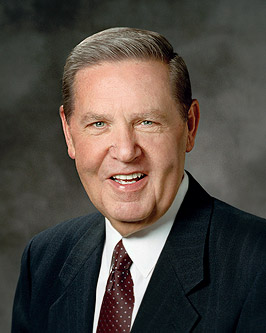
“You can change anything you want to change and you can do it very fast. That’s another Satanic deception that it takes years and years to repent. It takes exactly as long to repent as it takes you to say, “I’ll change”–and mean it. Of course there will be problems to work out and restitutions to make. You may well spend–indeed you had better spend–the rest of your life proving your repentance is genuine by its permanence. But change, growth, renewal, repentance can come for you as instantaneously as it did for Alma and the Sons of Mosiah. Even if you have serious amends to make, it is not likely that you would qualify for the term “the vilest of sinners” (Mosiah 28:4) which is Mormon’s phrase in describing these young men. Yet as Alma recounts his own experience in the 36th chapter of Alma [Alma 36] it appears to have been as instantaneous as it was stunning. Do not misunderstand. Repentance is not easy or painless or convenient. It is a bitter cup from hell. But only Satan who dwells there would have you think that the necessary and temporary discomfort of acknowledging your sins is more distasteful than permanent residence there. Only he would say, “You can’t change. You won’t change. It’s too long and too hard to change. Give up. Give in. Don’t repent. You are just the way you are.” That, my friends, is a lie which comes from desperation. Don’t believe it.”
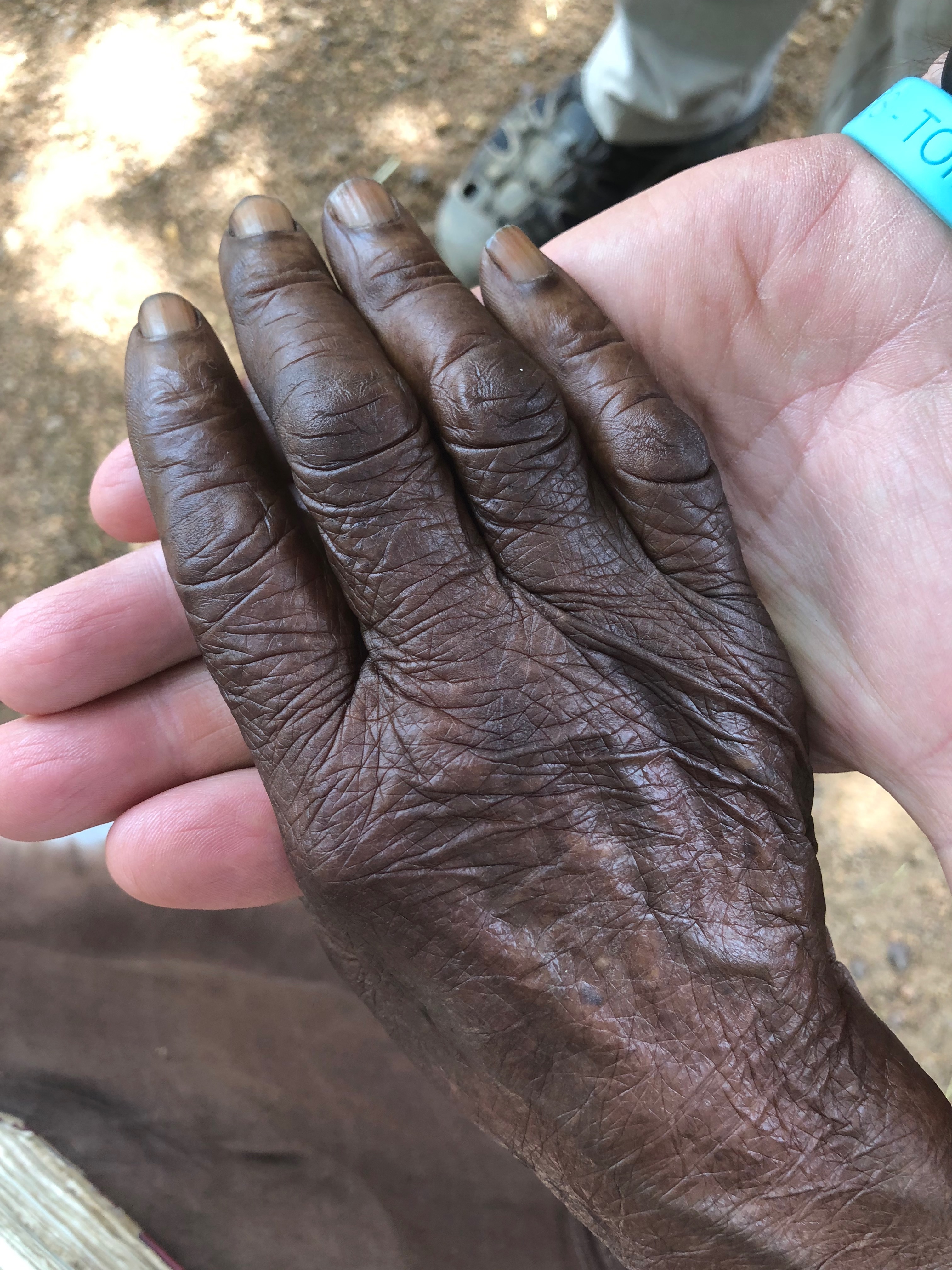
Chiefdoms in Sierra Leone continue to exist as a way to help the communities progress, resolve disputes among the people and appropriate and govern land. With time, these traditional means of government will continue to diminish as infrastructures and communication methods continue to improve. There is however, one “Chiefdom” that will continue to increase. That is the Chiefdom of our Lord and Savior Jesus Christ. We see the growth and strength of His kingdom unfolding every week here in Kenema. It is exciting and gratifying to be a part of this important part of Sierra Leone’s history as we work hand in hand with each other and the marvelous people of Sierra Leone!
Thank You for sharing! It is a wonder to know about the success you and LaDawn are experiencing there. I am so happy for you.
LikeLike
Thanks Susan!
LikeLike
These never cease to touch me as I pause from the busy life here and read of the food you are doing. God bless you both
LikeLike
Great write up President. Such wonderful work.
LikeLike
Thanks Dell. But you know I am Tom. 🙂
LikeLike
What an amazing report! It is wonderful that you are having these grand experiences, able to meet so many people and do the Lord’s work. Praying for your success and safety as you spread the gospel!
LikeLike